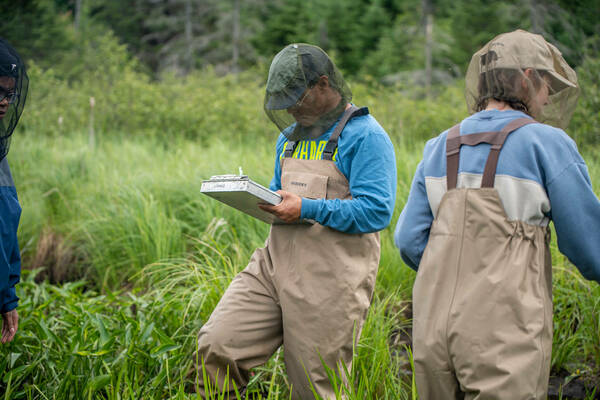Undergraduate Field Courses
Undergraduate Field Courses
Undergraduate Field Courses
UNDERC provides opportunities to promote understanding of field biology and how field research is conducted for 10 weeks throughout the summer in the northwoods of Wisconsin and Michigan.
Tuition, housing for the summer field courses, and transportation from Notre Dame to the field sites are paid for by UNDERC. Participants receive:
- $5000 stipend
- $500 research budget for supplies (Track 2 only)
- Unique research opportunity
Deadline
Application deadline has now passed for the Track 1 Program.
Courses

BIOS 35501-01: Introduction to UNDERC
A one-credit introductory course during the spring semester provides students with the basic background in aquatic, terrestrial, and environmental biology necessary for the field course. Training in the design of experiments, data collection and analysis, and the presentation of research results are included. Student materials (weekly handouts, PowerPoint presentations, etc.) are posted online for off-campus students not able to attend or enroll in the course.
BIOS 35502-01: Practicum in Field Environmental Biology, Track 1
This opportunity is offered to individuals at any stage of their undergraduate education that have an interest in gaining training and research experience in field biology. You will receive a structured introduction to field biology through a mixture of classroom and field training at the UNDERC facility. Classroom training includes visits to the George W. Brown, Jr. Ojibwe Museum and Cultural Center and the Great Lakes Indian Fish and Wildlife Commission. Classwork will also promote understanding of Native American attitudes towards the environment for non-Native American students. The summer is broken up into four learning modules including - vertebrate ecology, invertebrate ecology, aquatic ecology and forest ecology. This training will be leveraged by the class to conduct a summer-long collaborative research project.
- 10-week summer course from May through July
- Students from Notre Dame and other universities
- Consideration is given to Native American and Puerto Rican students
- Focus on a variety of taxa and natural habitats in the Michigan Upper Peninsula
- Four 1-week modules
- Aquatic Ecology
- Forest Ecology
- Invertebrate Ecology
- Vertebrate Ecology
- Collaborative research project
- Research symposium in the final week of class
Students must complete the UNDERC-East Track 1 program before being considered for the UNDERC-East Track 2 program.
BIOS 35503-01: Practicum in Field Environmental Biology, Track 2
This independent research opportunity is offered to undergraduates that have completed Track 1 or have had at least one summer or semester of research experience. An UNDERC-affiliated scientist will mentor each student on the development of a research proposal, implementation of the project, analyses of the data collected, and the writing up and presentation of the project at the end of the summer. Past projects have ranged from behavioral, population, community, and ecosystem ecology to local Native American ecosystem use.
UNDERC Track 2 Applications are due by February 2, 2024. Apply Here.